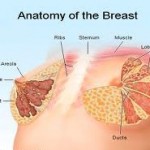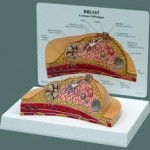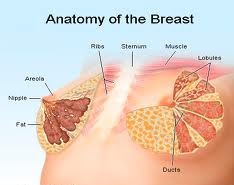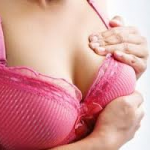Breast fibroids are also known as mammary dysplasia, fibroid breasts or fibrocystic breast disease. The fibroids are non-cancerous rubbery nodules that cause occasional pain and swelling near the surface of the breasts. They are usually caused due to the changes in the hormones during the menstruation cycles. Accumulation of fluid in the cells also causes this condition. Though not a very dangerous situation, in some women breast fibroids can develop into breast cancer. So they have to be evaluated frequently by using mammograms.
 According to the studies, the breast fibroids are developed due to the hormonal changes that directly affect the breasts. Hormones like estrogen and progesterone directly affect the breast tissue, cell multiplication and cell growth due to their fluctuations. Other hormonal imbalances include that of prolactin that is responsible for lactation, insulin, growth factor and thyroid hormone. The hormones produced in the breast cells send signals to the neighboring cells that are responsible for cell growth and division. If the process is hindered in any way the cell growth is stopped and results in breast fibroids.
According to the studies, the breast fibroids are developed due to the hormonal changes that directly affect the breasts. Hormones like estrogen and progesterone directly affect the breast tissue, cell multiplication and cell growth due to their fluctuations. Other hormonal imbalances include that of prolactin that is responsible for lactation, insulin, growth factor and thyroid hormone. The hormones produced in the breast cells send signals to the neighboring cells that are responsible for cell growth and division. If the process is hindered in any way the cell growth is stopped and results in breast fibroids.
About 1/3 of the women have breast fibroids after the age of 30. They may suffer from some kind of pain and discomfort that can interfere with their day to day activities and reduce the quality of life. In some cases the women suffer from severe pain too. Some women who have breast fibroids are at a risk of developing breast cancer because the cells that form the fibroids no longer respond correctly to signals that control cell growth and division. This indicates that a genetic error has occurred in these cells. When these atypical cells begin to multiply, the genetic error accumulates. These genetic defects are responsible for the development of breast cancer.
 Environmental, dietary and metabolic toxins may also interact with a woman’s complex hormonal system to increase the risk of genetic mutations in the breast fibroid, thereby increasing the chances of developing breast cancer. However, only about 5% of women with breast fibroids will experience the changes that could lead to breast cancer. So, if you find some of the symptoms of the fibroids it is better to consult your doctor immediately and get proper treatment. How will you identify the condition? There are various symptoms associated with this disease.
Environmental, dietary and metabolic toxins may also interact with a woman’s complex hormonal system to increase the risk of genetic mutations in the breast fibroid, thereby increasing the chances of developing breast cancer. However, only about 5% of women with breast fibroids will experience the changes that could lead to breast cancer. So, if you find some of the symptoms of the fibroids it is better to consult your doctor immediately and get proper treatment. How will you identify the condition? There are various symptoms associated with this disease.
The symptoms of breast fibroids can worsen during the menstruation or just before it. When menstruation stops the pain and other symptoms disappear. Usually, women who suffer from breast fibroids experience a feeling of heaviness in their breasts, pain, burning sensation, swelling and sensitiveness. Breast tenderness come and go often, there can be itching on the nipples and changes in sensation. Some women may also find lumpy and irregular areas on their breasts. Nipple discharge is also found in some people. Nipple discharge is a sign of cancer and other serious conditions. So fix an appointment with your doctor immediately if you find this and take the treatment immediately.
How can Breast Fibroids be Treated?
Treatment of breast fibroids can be segregated into the following therapies.
- Surgery – Doctors usually opt for surgery when the breast fibroids fail to disappear even after several attempts at removing the fluid. Surgery will involve removing the fibroid lumps from the breast.
- Dietary Therapy – Considered to be quite effective for the treatment of breast fibroids, doctors recommend the following nutritional therapy plan to control breast fibroids:
- Switch over to a low-fat, vegetarian diet because a high-fat diet not only causes obesity, but also results in imbalanced oestrogen levels, which is the primary cause of the development of breast fibroids.
- Start taking lots of cruciferous vegetables like broccoli, cauliflower, and cabbage, and high fiber foods like apples. All these increase oestrogen excretion.
- Vitamin-B rich foods such as brown rice, wheat germ and wheat germ oil, and nutritional yeast are also beneficial.
- Avoid taking caffeine foods like chocolate, carbonated sodas, concentrated starches like pastries and fatty dairy foods, hormone-laden meats and refined sugars.
- Avoid fried, sugary and salty foods, especially smoked or preserved meats during your menstrual period.
- Eat diuretic foods, like cucumbers and watermelons, and dark green leafy vegetables to neutralize and flush out the toxins.
- Drink plenty of water every day.
3. Medicinal Therapy – Doctors may recommend oral contraceptives to decrease symptoms of breast fibroids. In severe cases, when the potential benefit is thought to outweigh the potential adverse effects, a doctor may even prescribe a synthetic androgen.
4. Get a Good Bra – Last, but not least, it is very important to wear a well-fitted bra to provide good support to the breasts. This can help alleviate some of the discomfort caused by breast fibroid symptoms. Furthermore, performing a breast self-examination every month is also essential.

